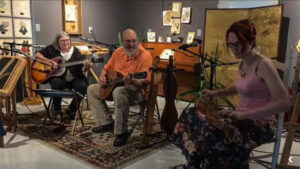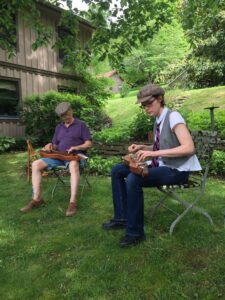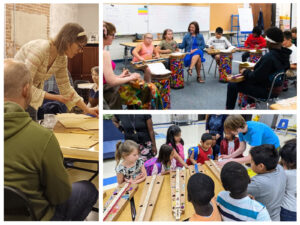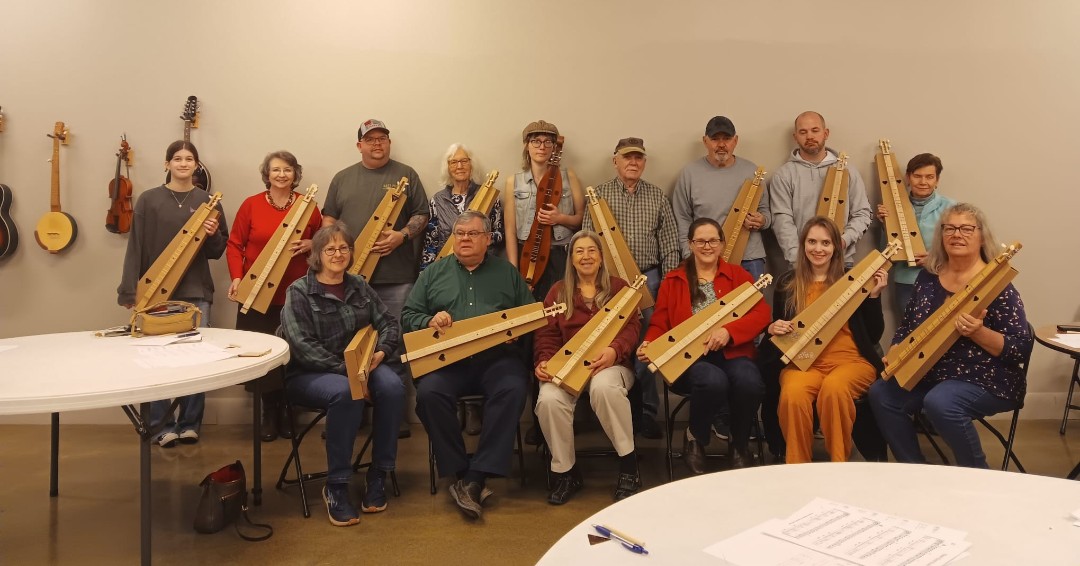My time at ETSU taught me a lot of things. I think the most important lesson it taught me was that I didn’t know as much as I thought I did. It started changing my worldview as well. I learned a lot about what it means to be Appalachian and the cultural inheritances that come with it. I grew as a musician, but I also began to think differently about my identity and the kind of person I wanted to be.
My work study was as a literacy tutor at a local elementary school, where I was assigned to a first-grade class led by a teacher named Claudette Decker. She became a friend and advisor to me. It was at her insistence that I began incorporating instruments in my work. Initially, I played a tune or two at the end of class before I left, but it became a way to connect with some of the more withdrawn children. It made learning more fun and helped some of them feel more comfortable opening up. It made me remember how powerful music was for me as a child.
I was becoming more serious as a dulcimer player now and had a better instrument. I met my first dulcimer teacher that spring: Jim Miller. He noticed my case one day and asked about it. We had a conversation and soon I was taking lessons with him. He took my understanding of the dulcimer to a new level. Our sessions felt like a break from the daily grind. Dulcimer became my joy.

After graduation, I worked as a preschool teacher. I continued using music in my work as much as I could, and the dulcimer was especially well-liked. I can’t even tell you the number of times I’ve had to play a rendition of “Baby Shark” on it. I worked in childcare right up until the start of the pandemic.
The pandemic was a watershed moment for me. I was out of work and gigs had dried up, but it was during this time that I met my second dulcimer mentor: a man named Don Burger. Don and his wife Deborah became sort of like surrogate grandparents to me during the pandemic. He led a dulcimer group in Jonesborough, but I only got to have a couple of in-person meetings with the group before everything shut down, and the group moved to meeting online using video call software like Zoom. It was something to look forward to each week; there weren’t many things going on, and this provided us with the opportunity to come together safely.

Don taught me taught me a lot about dealing with life and other people. He was more like a guru who happened to play dulcimer. He operated a small, now-defunct festival called Jonesborough Dulcimer Days and recruited me to help him keep it going during the pandemic. We would bring musicians into town and host them where we’d had our dulcimer meetings. Artists would perform for the small number of people in attendance, as well as viewers at home, via social media streams. He and I also set up around Jonesborough on different days and played our dulcimers publicly, often recording videos to share on social media. This gave me an opportunity to meet a number of dulcimer players, reunite with my old teacher Jim, and also play semi-regular gigs. In many ways, the pandemic was like a reset button for my life. It was a scary time, but on the other hand, I got to work on my craft and spend time doing things I enjoyed with people I cared about.
Don and Deborah moved back to New York towards the end of the pandemic, and I was deeply saddened to see them leave. However, Don left me with a couple of things. He recommended me as his replacement for teaching ukulele at the Memorial Park Community Center. I would also inherit a dulcimer class there from a man named Willis Jones after he became too ill to continue teaching. Being able to work with older adult students was a good experience because I could teach them about music, and they would often share stories or give me advice based on their life experiences. There’s a lot of valuable learning to be done in an environment like that.
Don also made an important connection for me. He introduced me to a man named Brian Mills, who runs a nonprofit called Art Transforms. It’s an organization that provides supplemental music and art education for students in the Johnson City School System. Don wanted to offer a two-week summer school class where students could learn about the dulcimer and build their own from cardboard using a kit. Since he was leaving, I was brought in to conduct the class. It ended up being very well-received, and we have continued it every year since.
When I heard about the Tradition Bearer’s fellowship, I didn’t initially think much about it, but some friends encouraged me to apply. I reluctantly did so, but didn’t want to get my hopes up. When I received word that I had been approved, I was overjoyed. It was a chance to expand on the work I was already doing with the dulcimer. It was also an opportunity to get more people involved with making music and keeping an Appalachian tradition alive. I used the funds to purchase as many cardboard dulcimer kits as I could and partnered with local schools, nonprofits, and the Birthplace of Country Music Museum to provide dulcimer-building workshops for as many people as possible, many of them children from lower-income backgrounds.

The last few years of my life have been especially healing. I’ve been able to let go of a lot of the pain and bitterness of the past. I’ve also come to have a new level of appreciation for not only the dulcimer, but for teaching and community building. I’ve been able to connect with more people and introduce the dulcimer to a wider demographic. It feels like I am finding my place, and I’m very grateful for what feels like a second chance at life.
When I think about how music has changed things for me, it makes me want to share that possibility with others. Music makes the good days better and the bad days bearable. Music has helped me embrace my Appalachian roots and gain a greater appreciation for them. It’s also given me strength in the face of persecution. Our identities, our communities, our traditions, and our stories matter. Music can not only keep all of these alive but strengthen them. It is my hope that music can be a source of strength and refuge for all who need it.


